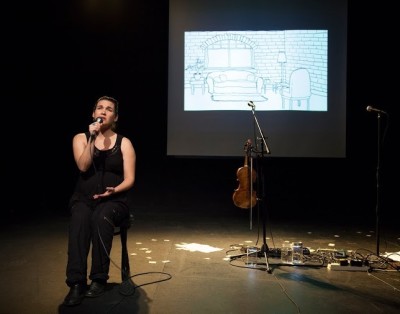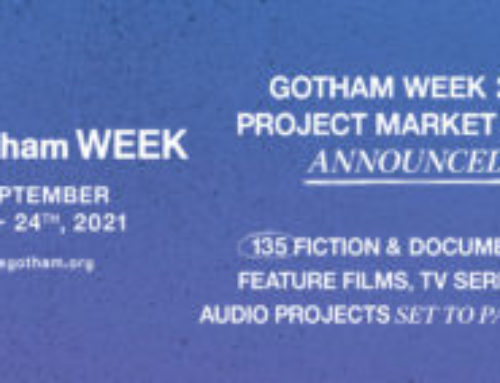by Nathan Tucker
Portland Monthly Magazine
In Ugandan playwright Deborah Asiimwe’s Appointment with gOD, a group of nervous visa hopefuls sit in the waiting room of a US embassy office in an unnamed developing country, trading stories and tips. Their reasons for coming to the States are varied—to pursue an education, to visit family, to find work, to evangelize, or, in the case of the protagonist, to attend a theater workshop—but they share in common the harrowing experience of submitting oneself to the seemingly arbitrary judgment of these gatekeepers to our shores, a first experience of the US that many Americans never think about, least of all experience.
It’s compelling material all on its own, but audiences at a workshop performance hosted by PSU last spring were treated to an experience the scale of which belies the term “workshop.” The performance was directed by Emily Mendelsohn, who’s spent seven years collaborating with Asiimwe (ironically, Asiimwe had to participate via Skype, as she was denied a visa by the US Embassy). The reading included several of Portland’s most commanding actors alongside Portlanders from Bangladesh, Mexico, Rwanda, Cameroon, and Nigeria; Ghanaian drummer Alex Addy (son of the late Obo Addy),;an installation piece about the immigrant experience filled the theater’s lobby; and the cast and community members sharing their own experiences of the visa process during talkbacks. “It’s like I was reliving my experience multiple times,” said talkback participant Kayse Jama, Executive Director of local nonprofit the Center for Intercultural Organizing, which collaborated on the production. “As I was watching the play, I almost got PTSD.” (See a short documentary of the project below.)
There’s only one arts organization in town producing this sort of multi-faceted, immersive, and intellectually captivating theater: Boom Arts. Founder Ruth Wikler-Luker describes her upstart project, which she started in 2012, as “a boutique presenter of theater and performance from around the world.”
Utilizing a mix of fully staged, semi-staged, and script-in-hand work, it’s a small-scale, flexible model that lets this imaginative curator do essentially whatever she wants, on her own terms. “What I look for, as a curator, is socially relevant work that’s also formally exciting,” Wikler-Luker explains. “I’m looking for artists who are addressing the world around us in interesting ways, and who are drawing on interesting artistic tools.” In the case of Appointment with gOD, that meant singing, drumming, and visuals. In the case of another hit last season, A Kaddish for Bernie Maddoff, it meant violin music and original annimation.
Boom’s upcoming production, a reading of celebrated German playwright Roland Schimmelpfennig’s The Golden Dragon, further illustrates that combination of elements—what Wikler-Luker calls her “magic potion.” The play is a chaotic and irreverent rumination on immigrant culture and disenfranchisement that’s made waves around the world for its unusual staging elements and its incisive take on globalization. Seattle’s Azeotrope Theatre and nationally sought-after director Desdemona Chaing make the trip down I-5 for this first-ever collaboration between the two organizations.
The play centers on the fast-paced kitchen of a Chinese restaurant, and calls for five actors rotating at breakneck pace between parts that vary wildly in age, ethnicity, and gender. “The humane thing that’s happening is that the guy who’s playing the 65-year-old small business owner is the same guy playing the cook in the kitchen.” By having the same actor play characters of different backgrounds in a play about ethnic and cultural tension, Schimmelpfennig amplifies his message.
“It’s a communication to any audience that has new immigrants coming into their communities,” Wikler-Luker argues. “Are you going to exploit them and prey on them in their vulnerable moments? Or are you going to do something that helps us all to evolve?”
In some ways, it’s surprising Boom hasn’t produced The Golden Dragon sooner. In the US, where few translated works reach the stage, it’s one of the few plays in translation that other theater producers will even consider. “This is Brecht for the 21st century,” says Wikler-Luker. “[Schimmelpfennig] is brilliant and has a very strong hand in [The Golden Dragon]. He’s communicating with the audience through the formal aspects of the play.”
Even the reading’s venue betrays the holistic commitment with which Wikler-Luker throws herself into Boom’s projects. “I consider site selection to be part of the curatorial role,” she says. “In this case, we’re talking about an urban underbelly theme, and the theater is under the Hawthorne Bridge in that industrial area.”
A special edition of Know Your City’s walking tour of Chinatown and Old Town, presented in conjunction with The Golden Dragon and focusing on Portland’s own history of immigration, rounds out the experience.
The rest of Boom’s 2014 season is equally promising:
- Next up is Spanish-Argentine playwright Rodrigo Garcia’s I’d Rather Goya Robbed Me Of My Sleep Than Some Other Son Of A Bitch (a title that’s not much less unwieldy in the original Spanish), a one-man show in which financial and philosophical crises lead a father to take his sons on the road trip and bender of their lives. Boom will bring UK director Jude Christian across the pond to build on her celebrated staging at the Gate Theatre in London from earlier this year. It included two unruly live piglets representing the two sons, an element the Boom production plans to reprise. “[The play asks] how you reconcile having a bunch of cultural capital, but not having a lot of economic capital,” Wikler-Luker explains. Jan 28–29, Feb 5-7, Disjecta
- Syrian playwright Mohammad Al-Attar’s A Chance Encounter will follow. Wikler-Luker’s excitement at the prospect of working with Al-Attar, who now lives in Beirut, is evident: “He’s a young guy who’s really dedicated to art and social change,” she enthuses. That dedication is unsurprisingly wrapped up in the ongoing crisis in his homeland. “Right now he’s in rehearsals to do a version of Antigone with all Syrian refugee women.” Apr 10–12, PSU’s Lincoln Hall Studio Theater
- Wikler-Luker seems particularly excited for the last performance of the season, which she calls “emblematic of where we’re headed.” Boom plans to bring Laryssa Husiak and Katherine Brook from New York to perform their new theater piece She Is King. The play tells the story of tennis star Billie Jean King by transplanting audiences right into ‘70s TV studios to depict the real-life talk show appearance of one of America’s most trailblazing female athletes. “By restaging actual interviews, you see gender bias at work,” Wikler-Luker points out. “It’s the best possible way to do it. You think, ‘What questions are they asking her? Are you kidding me?’” Mar 28–June 7, CoHo Theatre
Audiences’ enthusiasm for Boom’s intellectually robust and socially urgent programming style shows: counter to most theater audiences, almost the entire house sticks around for the talkback. “People think about the talking part as part of the event, and it’s because I program based on content,” claims Wikler-Luker. “They say ‘You can put me through the art, if I can get to that content.’ And the amazing thing is if you pick the right work, the art can blow your mind.”




